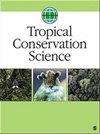加蓬Moukalaba-Doudou国家公园附近的人象冲突:社会经济变化和保护项目对当地容忍的影响
IF 1.6
4区 环境科学与生态学
Q2 BIODIVERSITY CONSERVATION
引用次数: 13
摘要
人象冲突(HEC)给非洲当地的生计和大象保护带来了严重的问题。对大象的伤害是当地人为与大象共存而付出的代价,并被认为会降低对大象的容忍度。然而,与保护相关的项目,通过它们提供的好处,可能会提高当地人对大象的容忍度。本研究旨在通过2010年和2019年两个时期的长期民族志研究和访谈调查,研究大象对作物的破坏以及保护活动所带来的好处如何影响加蓬西南部穆卡拉巴-豆豆国家公园周围当地人对大象的容忍。根据研究结果,大象对农作物的破坏对当地社会经济产生了重大的负面影响,导致该地区人口减少,当地人对大象非常反感。然而,在一个集中从事研究和保护活动的村子里,许多人都承认与野生动物有关的好处,并对大象表示高度容忍。这些发现表明,保护活动的好处可以增加人们对大象的容忍度,而大象造成的作物破坏对大象的容忍度产生了负面影响。然而,也应该注意到外部生成的项目有局限性和缺点。重要的是建立一个广泛共享和合理分配的保护效益和收入资源多样化的制度。需要采取多部门干预措施,重点关注当地的社会生态脆弱性,以减轻人象冲突,推进非洲象的保护。本文章由计算机程序翻译,如有差异,请以英文原文为准。
Human-Elephant Conflict Around Moukalaba-Doudou National Park in Gabon: Socioeconomic Changes and Effects of Conservation Projects on Local Tolerance
Human-elephant conflict (HEC) poses a serious problem in Africa for both local livelihoods and elephant conservation. Elephant damage is the price local people pay for coexisting with this species, and is assumed to reduce tolerance for elephants. However, conservation-related projects, through the benefits they offer may enhance local tolerance toward elephants. This study aimed to examine how crop damage by elephants and the benefits gained from conservation activities affect local people’s tolerance toward elephants around Moukalaba-Doudou National Park in southwest Gabon based on long-term ethnographic research and interview surveys in two periods (2010 and 2019). Based on the results, crop damage by elephants had a significant negative impact on the local social economy, leading to a decrease in human population in the area and making local people highly resentful of elephants. However, in one of the villages where employment from research and conservation activities was concentrated, many acknowledged the benefits associated with wildlife and expressed high tolerance for elephants. These findings suggest that benefits from conservation activities can increase tolerance toward elephants, which is negatively affected by the crop damage they cause. However, it should also be noted that externally generated projects have limitations and drawbacks. It is important to establish a system in which the benefits of conservation are shared widely and distributed appropriately, and wherein income resources are diversified. Multisectoral interventions focusing on local socio-ecological vulnerability are needed to mitigate human-elephant conflict and advance the conservation of African elephants.
求助全文
通过发布文献求助,成功后即可免费获取论文全文。
去求助
来源期刊

Tropical Conservation Science
BIODIVERSITY CONSERVATION-
CiteScore
3.60
自引率
5.90%
发文量
16
审稿时长
>12 weeks
期刊介绍:
Tropical Conservation Science is a peer-reviewed, open access journal that publishes original research papers and state-of-the-art reviews of broad interest to the field of conservation of tropical forests and of other tropical ecosystems.
 求助内容:
求助内容: 应助结果提醒方式:
应助结果提醒方式:


